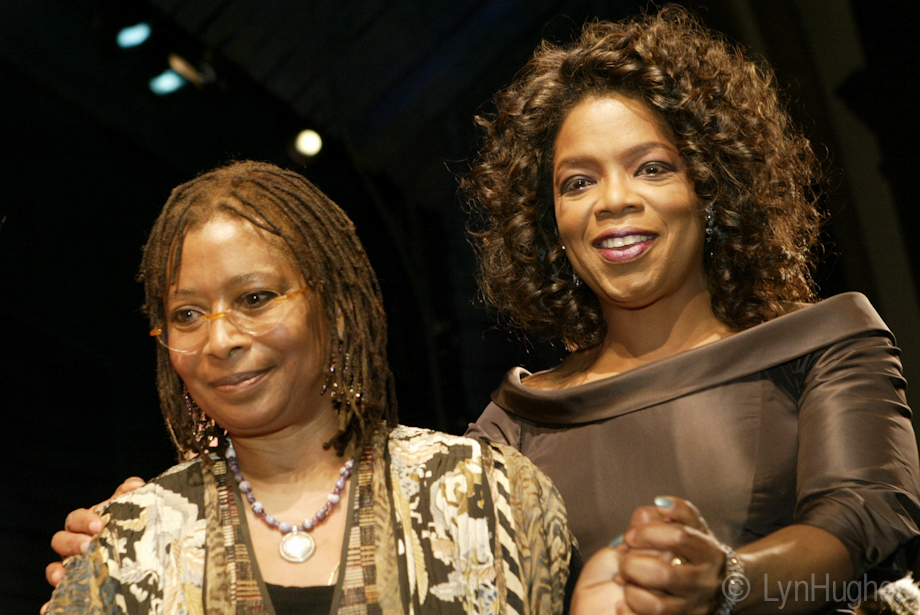[vc_row][vc_column][vc_column_text]Playwright, educator, opera singer, and Queen, Mfoniso Udofia has two plays running at New York Theatre Workshop. *pause* TWO PLAYS. In the SAME season!?!? *ends congratulatory gasp* Sojourners and Her Portmanteau are performed in repertory, as two chapters of Udofia’s sweeping, nine-part saga, The Ufot Cycle. Admittedly, before researching each show, I didn’t know the definition of either word; and in the spirit of keeping it consistent with the honesty, I didn’t like either play. I loved them.
Sojourners
Minimalism seems to be the name of the game these days. I sat down to a completely black stage, sans a multimedia display lodged on the ceiling at a 45-degree angle. Clutching my all white program and bobbing my head to the ‘70s pop rock pre-show music, I prepared my heart for the story of Sojourners, well at least that was the plan. The stage begins to rotate and we meet Abasiama (Chinasa Ogbuagu) and Ukpong (Hubert Point-Du Jour), Nigerian expatriates sojourning in Houston, Texas with the plan to start a family, earn their degrees, and go back to Nigeria until life happens.
Charming and handsome, Ukpong becomes defined by his leather jacket, shoulder work and shimmy which match the fascination and yearning for freedom that illuminates his eyes every time he talks of peace, protest, and Prince–all shaping his view of 1970s America, and consequently, the American Dream. But does leather compensate for grit? Is a movement or vibe really a panacea for disappointment, aimlessness, and a need to find yourself? Abasiama enters the play pregnant, purposed, and outfitted in pieces of Nigerian garb, grounded in duty showing a stark contrast to Ukpong who floats in desire. What’s lost in your household is found elsewhere, and this is when we start to see, and root for, Abasiama’s transformation from timid to tenacious.
Enter Moxie (Lakisha May), a colorful prostitute turned protector and friend. There is a mutual respect despite great differences between her and Abasiama, with their love for one another creating moments that make you believe in the beauty of humanity. Enter Disciple (Chinaza Uche), another warm and determined hearted immigrant who has come to the United States to study, rounding out the timely additions of love, support, and security when Abasiama needed them the most.
Through and through this is Abasiama’s story and she glows. Her kindness, her sisterhood, her strength, her worthiness, and the realization of her American Dream, guide her decisions—which is the catalyst behind the entire Ufot Cycle.
Her Portmanteau
Her “portmanteau”, or red suitcase, makes a return as 30 years have passed. Abasiama now has two daughters, one raised in America and the other who has come from Nigeria to reconnect with her family.
This is a good moment to mention that each story is informed by the other, but can certainly stand alone on substance, content, and the amazing direction of Ed Sylvanus Iskandar. The staging is exciting and deliberate, while minimal, putting the full focus on the tension and growth to be expected of a family reunited after a substantial amount of time and distance.
Chinasa Ogbuagu returns to the stage, this time as the American-born daughter, Adiagha Ufot, Adepero Oduye as Iniabasi Ekpeyoung (Ukpong and Abasiama’s daughter), and Jenny Jules as the mother, Abasiama Ufot.
Seated on a couch in Adiagha’s small New York Apartment, no amount of preparation readies your mind and spirit to form the words to make up for 30 years of life, connection, and memories missed. We’re taken on a ride of resentment, hurt, love, and forgiveness, as the portmanteau is literally unpacked. We watch the teeter-tottering between offense and defense as one sister tries to assimilate into American culture, and the other attempts, albeit stubbornly, to fall in formation in honoring a family she shares blood with, but little time or tangible history.
It’s powerful to see a story of history and continuing a legacy despite lost time, faulty promises, and difficult choices explored with an all-woman cast as far too often the idea of legacy is framed in patriarchy. Jules admirably takes Abasiama through the fire to heal, to feel, and to fix her family. The narrative allows us to empathize and understand the struggle that comes with upholding family values versus cultivating a space to achieve personal dreams and happiness.
Her Portmanteau (and Sojourners) is written in a way that finds your soul, gently massaging it with humor, while leaving it with very real questions. I’ve never felt a greater need to binge read nine stories and simultaneously study the story of my own family tree. I left changed. I left wrapped in the strength of my mom and my mom’s- mom’s sacrifice. I left pensive and with seeds of future forgiveness planted. I left changed.
For capturing our hearts with wit and with truth. For putting Black women at the center of a poignant narrative. For unapologetically telling a story you haven’t seen told and telling it in the way you want it to be told.
We thank you Mfoniso. We thank you.
Have you seen the #duetplays? Sound off in the comments below![/vc_column_text][/vc_column][/vc_row]




Pingback: Montego Glover Joins the Cast of Les Miserables As Fantine
Pingback: Grasan Kingsberry: A Man Called to Dream, Create, & Love - BroadwayBlack.com
Pingback: The Color Purple – Welcome To 1982